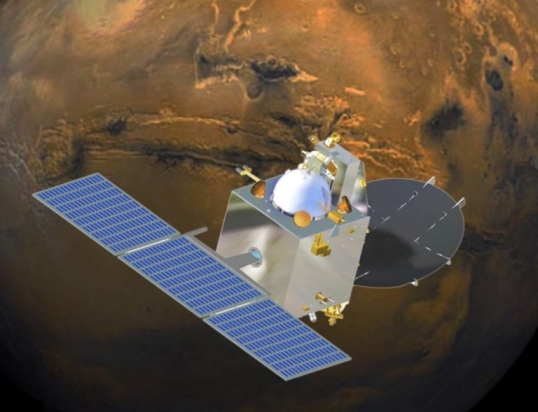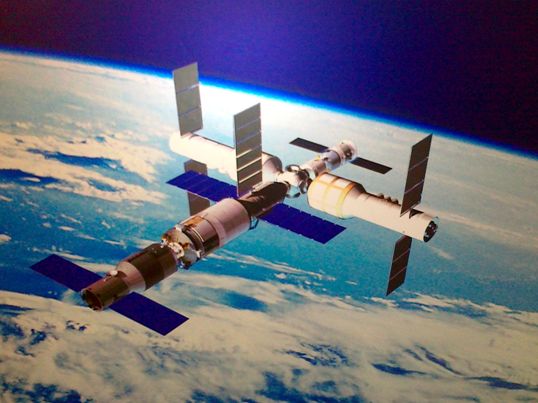
An ISRO image of the Mars Orbiter spacecraft.
BANGALORE (PTI): As India's Mars Orbiter Mission (MOM) races for its tryst with the Red Planet on September 24, Indian space scientists are gearing up for the critical manoeuvre of the spacecraft, sounding confident about the mission's success.
The spacecraft has covered 98 per cent of its 300-day odyssey and the critical manoeuvre would be performed when the scientists restart the onboard liquid engine which is in sleep mode for nearly 10 months.
The MOM, India's first interplanetary mission, was launched on November 5, 2013 by India's workhorse Polar Satellite Launch Vehicle (PSLV) from the spaceport of Sriharikota in Andhra Pradesh.
At a media briefing, ISRO said on Monday it was confident about the MOM's success going by its performance so far.
Commands for inserting the Mars spacecraft into the Red Planet's orbit were being uploaded since Sunday and were expected to be completed on Monday, it said.
"The remaining crucial thing is Mars Orbit Insertion, and if you see some missions have failed because of failures in estimates in the distance from the Mars, and if you see the history they were at very early stages....," ISRO Scientific Secretary V Koteswara Rao said.
"We are very confident; there is no reason not to be confident going by the performance of the system so far. We have covered 98 per cent of the journey and another 2 per cent we are going to complete soon. We are very confident, teams are all very confident," he said.
If the Rs 450 crore MOM mission turns out to be a success, ISRO would be the fourth space agency in the world to have sent a mission to Mars.
European Space Agency (ESA) of European consortium, National Aeronautics and Space Administration (NASA) of the US and Roscosmos of Russia are the only three agencies which have so far sent their missions to the Red Planet.
Only 21 of the total of 51 missions sent to Mars by various countries have been successful.
In the final critical manoeuvre, the space scientists would use the commands to fire the spacecraft's propulsion system for 24 minutes to slow it down just enough to be captured into the Martian orbit.
The now shut off Liquid Apogee Motor (LAM) engine has to be fired again for MOI, Rao said. The engine stored in the orbit for about 300 days without operation has to be restarted which "is very essential for MOI."
MOI will be performed on September 24 at around 7:30 AM, Rao said. "When we go there, the distance between the Earth and the spacecraft will be 224 million km. Today, the distance between Earth and the Mars orbital spacecraft is 215 million km. The present one way communication is approximately 12 minutes."
He said out of the 666 million km, the spacecraft had covered 653 million km so far. "We are yet to go another 13 million km which tells us that 98 per cent of the journey has been covered so far."
"The distance between Mars and MOM is 2.496 million km approximately now; all the subsystems of the spacecraft are in good health and payloads health is also normal," he added.
Rao said: "If you see the history of the failed missions - they have failed at various stages, some have failed during the launch which we have crossed, some of them have failed during trans Mars injection which we have crossed, some of them were lost on the way - we have completed 98 per cent of the journey."
"The remaining crucial thing is Mars Orbit Insertion, and if you see some mission have failed because of failures in estimates in the distance from the Mars, and if you see the history they were at very early stages....," he added.
India would be the first Asian country to go to Mars and also the first to succeed in the maiden attempt if the mission is successful, Rao said.
 Previous Article
Previous Article Next Article
Next Article













The Indian Air Force, in its flight trials evaluation report submitted before the Defence Ministry l..
view articleAn insight into the Medium Multi-Role Combat Aircraft competition...
view articleSky enthusiasts can now spot the International Space Station (ISS) commanded by Indian-American astr..
view article